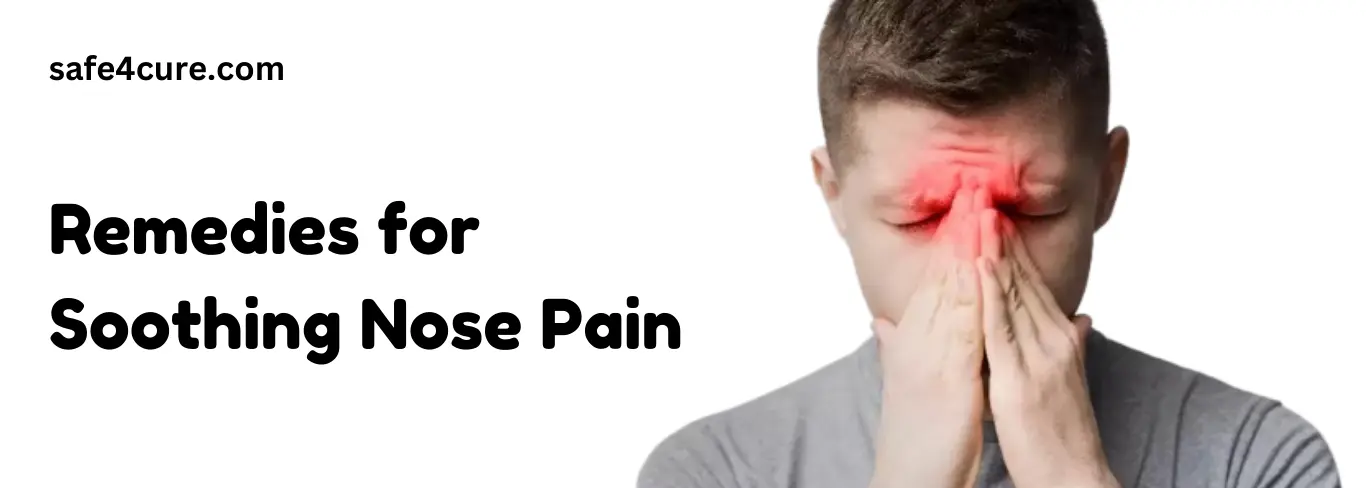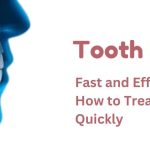Nose Pain (A-Z) Like, Causes, Symptoms, Types & Treatment. Click to learn also about sinus pressure relief, tooth pain from sinus, sore throat body aches headache, inside of nose hurts, best treatment options to treat it.
Usually, issues in the naval cavity are linked to nose pain. Less frequently, problems with one or more of the nerves that regulate feeling to the face can be the cause of a sore nose. Before the smooth cartilage of the nose, there is a hard area on the nose called the bridge.
The proximity of the sinuses to this area of the body makes it susceptible to injury and infection. When your nasal cavities get infected, swollen, and inflamed, you will experience pain in your nose, also known medically as sinusitis or rhino sinusitis. Nose pain can develop as a result of fluid buildup in the sinuses, which allows bacteria to flourish.
What Is Nose Pain?
The soft tissue covering your nose pain becomes inflamed or swollen when you have sinusitis. Your face has structures called nose pain that is usually air-filled.
They can get irritated by infections caused by bacteria, viral infections, and allergies, which can lead to them becoming blocked and fluid-filled.
Your face (Face Pain) may feel tight and painful, you may have nasal congestion and other symptoms. Rhino sinusitis is another name for nose pain.
Four linked cavities in your head are the cause of your nose pain. They are connected by little tunnels. The mucus flows out of the nasal passages when you have nose pain. Your nose stays clean and free of bacteria, allergies, and other germs thanks to this drainage.
How Many Types of Nose Pain?
According to how long it has persisted and if a virus, bacteria, or fungus is to blame, we categorize different types of nose pain.
Nose pain types Acute, subacute, chronic, and recurrent sinusitis
Acute Nose Pain:
Nasal congestion, discharge, facial pain or pressure, and a diminished sense of smell are among the short-term symptoms of acute nose pain. Viruses, like those that cause the typical cold, frequently cause it. Learn about Acute pain.
Subacute Nose Pain:
Signs of subacute nose pain last four to twelve weeks.
Chronic Nose Pain:
Signs of chronic nose pain persist for at least twelve weeks. Usually, germs are to blame. All about Chronic Pain.
Recurrent Nose Pain:
The signs of recurrent acute nose pain return at least four times a year and linger for a little longer than two weeks every time.
What Are The Nose Pain Symptoms?
The signs of nose pain can resemble symptoms of a cold. The following are the key indicators of viral nose pain:
- face pressure or pain
- foul-smelling nasal discharge
- nasal obstruction
- Nasal post-drip
- Thick yellow or green mucus with a runny nose
- Clogged nose
- Facial pressure. When you turn your head or stoop, this might get worse
- Your teeth may be under pressure or hurt
- Pain in the ears
What Causes Nose Pain?
Nose pain can be brought on by viruses, bacteria, fungi, and allergies. The following are specific causes of nose pain:
- The typical cold
- The illness
- Germs called Streptococcus pneumonia
- The virus is hemophilic influenza
- The bacterium Moraxella catarrhal
- Both seasonal and nasal allergies
What is The Best Nose Pain Treatment?
It could be challenging to prevent environmental sources of nose discomfort signs other than excessive amounts of bug spray or avoiding specific meals. To check for serious injuries, schedule a quick consultation with a physician if the signs are brought on by trauma. Here is the best medication to treat this pain, Carisoprodol, and Tapentadol tablet.
At-Home Treatments for Nose Pain
The following remedies can be used at home to alleviate or possibly avoid nose pain.
Rest and ice:
Apply a pack of ice to your nose every fifteen minutes to lessen irritation and stop fluid from continuing to collect in your tissues.
Reduce contact with things that can give you upper nasal infections:
Spreads upper respiratory infections are typically spread from person to person. Avoid talking to persons who are congested, wash your hands regularly, and follow other hygienic habits.
Avoid pollutants:
Both allergic and non-allergic nasal passage irritation and inflammation can be caused by smoke from cigarettes and other contaminants. Take steps to reduce your exposure to these pollutants to avoid experiencing nose pain symptoms.
Control inflammatory and allergic diseases:
Your nose will be safeguarded from assaults that can quickly produce pain and its accompanying symptoms if you manage the signs of allergy symptoms and other inflammatory disorders.
When To See A Doctor For Nose Pain?
The following are some examples of nose pain signs that may point to a fundamental chronic issue that requires expert therapy:
Irrigation:
Saline nasal sprays or treatments can increase drainage, lessen obstruction, and rinse out irritants from the nose pain. This can significantly lessen pain from both inflammation and obstructive sources.
Inhibitors of pain:
To treat your nose pain symptoms, your physician might give you over-the-counter painkillers.
Anti-inflammatory:
Inhaled steroids and other anti-inflammatory drugs are frequently used to treat and prevent inner nose swelling and pain, which has numerous origins.
Decongestants:
Decongestants assist reduce discomfort and the signs that go along with it by clearing up congestion and obstruction feelings.
What are untreated nose pain infection risks?
After around ten days, nose pain infections frequently start to heal on their own. A physician might need to treat the infection’s underlying cause if the signs persist for a longer period of time without getting better or if they get worse.
When to see a doctor for nose pain?
Schedule a visit with your physician if you experience serious symptoms or if any of the following symptoms persist for over ten days or are recurrent:
- fever
- nasal dripping
- congestion
- face hurt
What if nose pain infections in children?
If your kid exhibits any of the following signs, they may have nose pain:
- A common cold with a high temperature that lasts longer than seven days.
- Swells around the eyes
- Thick, colored snot coming out of the nose
- Postnasal drip, which can result in foul-smelling breath, coughing, dizziness, or vomit
- Migraines
- Earaches
Can nose pain cause dizziness?
Yes, in some instances. Feeling dizzy or vertigo may occur if the pressure in the middle of the ear begins to build up.
Can nose pain cause tooth pain?
Yes, Tooth discomfort frequently alludes to sinus pressure, particularly in the area of your upper teeth.
Read more: Nose Pain (A-Z) Like, Causes, Symptoms, Types & Treatment


2 Comments